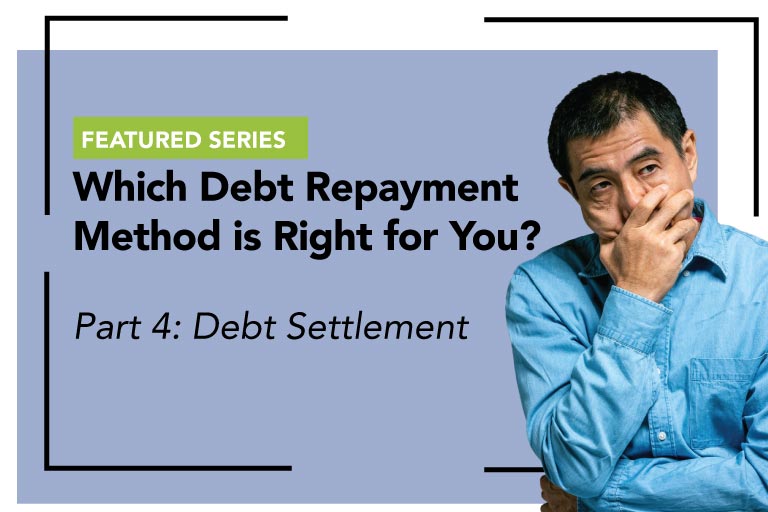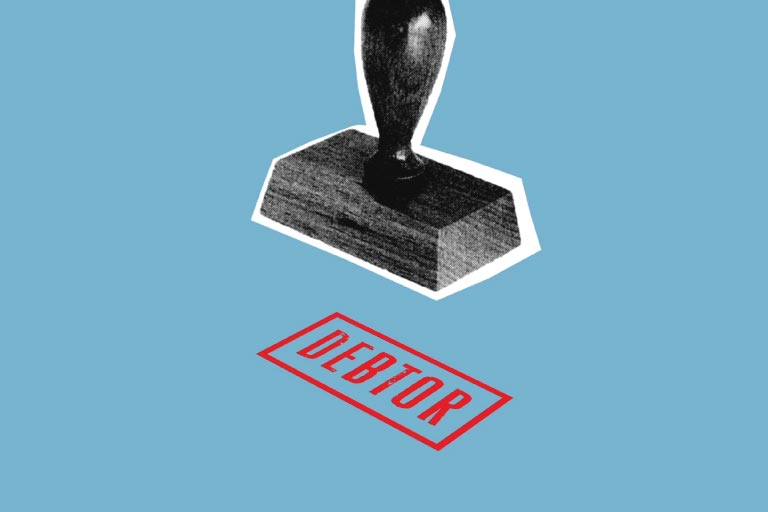Which Debt Repayment Method is Right for You? A Closer Look at Debt Settlement

When you have significant credit card debt, you want to develop a plan to pay it off as quickly as possible. The debt can keep you from achieving your financial goals, and if you aren’t careful the growing interest can spiral out of control. For some, Debt Settlement may be a solution.
HOW TO USE THIS GUIDE
The guide is broken down into four sections, one for each repayment method: Debt Management Program, Debt Consolidation, Bankruptcy, and Debt Settlement.
Each section will provide in-depth detail about how a particular repayment method works. It will explain how much the service costs, how it may affect your credit, how long it takes, and so on. At the bottom of each section is a Summary section, which highlights this information quickly. Read on, or use these quick links to jump to previous sections.
As this is part 4, we’re taking a closer look at Debt Settlement as an option for repayment.
What is debt settlement?
There are two types of debt settlement: professional and do- it-yourself (DIY) debt settlement. Most of what we say below applies to professional debt settlement. However, let’s take a quick look at the two types:
Professional settlement is generally considered to be a risky and ill-advised debt repayment scheme. In the scheme, you avoid paying your debts. Instead, you send payments to a debt settlement firm. The firm then attempts to negotiate settlements with your creditors. The goal is to receive a “principal reduction,” which occurs when a creditor considers your debt satisfied even though you pay less than the full amount due.
DIY settlement does not involve a third-party firm representing you. It could involve a third-party representing the creditor. This “do it yourself” version is considered to be less expensive. It occurs when you negotiate directly with a creditor and they agree to consider your account paid for less than you owe. Creditor willingness to accept DIY settlement prior to charge-off is limited. DIY settlement following charge-off could involve a third-party representing the creditor, like a law firm, collection agency, or debt buyer. DIY settlement, while cheaper to the consumer, it still comes with all of the same credit score damage.

If you pursue DIY settlement, be sure to get the settlement agreement in writing before you pay the creditor a lump sum.
How do you get started? As we explain below, we do not recommend professional debt settlement under any circumstances. If you choose to pursue it, you would start by contacting a debt settlement firm to understand their process.
How much does it cost? The fees charged by a debt settlement firm may vary depending on your state’s laws. You can expect the firm to charge you between 15 and 25 percent of the enrolled debt. So, if you have a $10,000 debt that you settle for $5,000, you may also owe the firm $2,500 (25% of the enrolled $10,000.) In 2010 the FTC banned “advance” fees, so now debt settlement agencies cannot charge you before they render services.
The IRS considers forgiven debt taxable. This means you likely will owe taxes on the difference between the amount you owe and the amount you agree to pay. For example, if a $10,000 debt is settled for $6,000, the “forgiven” $4,000 is likely taxable income.
How long does it take? This process typically takes three to four years. First, you have to put ample funds into the settlement account. Then, the settlement firm has to negotiate agreements with your various creditors, which can take significant time.
How does debt settlement work?
It is built around the idea that if you do not make your payments, creditors will be happy to accept less than the full amount due. So, you avoid paying your debts directly, and you make payments to the settlement firm. The settlement firm then pays your creditor (assuming they negotiate a settlement). There are two types of settlement that they may negotiate. In a lump sum settlement, the firm makes one large payment to the creditor. In a term settlement, the firm makes multiple payments to the creditor over a period of time.
Some agencies may market settlement services for other debts, like student loans, medical bills, back taxes or other unsecured debts, but most of the time it is only for credit card debt.
Some major credit card companies refuse to work with debt settlement agencies. If you have debt with these creditors, then debt settlement will not be an option.
There are several major problems with debt settlement. First, by intentionally not paying your debts they will become delinquent. This could lead to debt collection or a lawsuit against you. If the lawsuit is successful, the creditor will obtain a judgment and may garnish your wages. Second, if you have multiple debts, the firm will have to negotiate with multiple creditors. They may not reach a settlement agreement with all of your creditors, which can make your situation even more complicated. Data has shown that fewer than 10 percent of consumers are able to settle all of their debts within 12 to 24 months of enrolling with a settlement firm.
Third, it has proven to be ineffective, and the success rates are very low. A recent study from the American Fair Credit Council (the debt settlement trade association) found that clients only settle 43 percent of their accounts by month 36 of the process. This means that you may only be able to settle with fewer than half of your creditors. Additionally, the study found that debt settlement clients end up paying more than 78 percent of their original balance due. This means that you would only be getting a 22 percent discount on your debt, and after factoring in the tax consequences your total “savings” will be even lower. Other studies (not conducted by the trade association) have shown even lower success and savings rates.
How will debt settlement impact your credit?
This first requires you to avoid paying debts. This makes your debts “delinquent.” Delinquencies on your credit report damage your credit score. The impact from this will be significant in most cases. The Center for Responsible Lending once predicted that a debt settlement client’s credit score would drop
60 to 100 points. We estimate that the drop in credit score exceeds 100 points in most cases.

Debt Settlement may be a good idea if you do it yourself. It allows you to pay less than you owe. However, you should only do this on your own by negotiating directly with your creditor and getting the agreement in writing before you pay.
We do not recommend using a for-profit debt settlement firm. Fees are high and success rates are low. Additionally, this course of action can wreak havoc to your credit score and lead to judgements and collection activity against you. It may not save you money at all if taxes are charged on the forgiven amount.
CONCLUSION
Hopefully this guide has provided a helpful overview of various debt repayment methods. If you are ready to begin your debt repayment alongside a credit counselor and would like to know more about pursuing a Debt Management Program, then contact one of our NFCC member agencies or call 800-388-2227.




